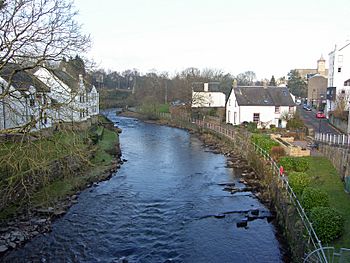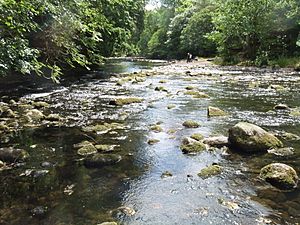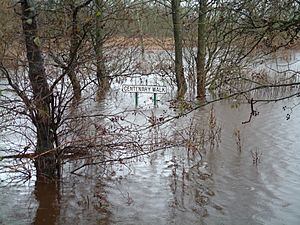Allan Water facts for kids
Quick facts for kids Allan Water |
|
|---|---|

The Allan Water at Dunblane
|
|
| Native name | Scottish Gaelic: Uisge Alain |
| Country | United Kingdom |
| Constituent country | Scotland |
| Physical characteristics | |
| River mouth | River Forth 56°08′30″N 3°57′16″W / 56.14167°N 3.95444°W |
The Allan Water (Scottish Gaelic: Uisge Alain) is a river in central Scotland. It starts high up in the Ochil Hills. The river then flows through a valley called Strathallan. It passes through the towns of Dunblane and Bridge of Allan. Finally, it joins the larger River Forth. Sometimes, the lower areas of Bridge of Allan can experience floods from the river.
Contents
Understanding the Name Allan Water
The name "Allan Water" is very old. It is similar to the names of other rivers in Scotland and England. For example, there's the River Alness and the River Ellen.
Ancient River Names
Around 150 AD, a writer named Ptolemy recorded some of these river names as "Alauna" or "Alaunos". Experts believe "Alauna" was an ancient British river name. It might come from an old European word meaning "to flow" or "to stream".
A River Goddess?
Some people think "Alauna" might have been the name of a Celtic river goddess. There was also a Gaulish god named Alaunus. He was known as a god of medicine and prophecy.
Allan Water in Music and Stories
The Allan Water has been mentioned in old songs and stories. These are called broadside ballads. They were popular songs printed on large sheets of paper.
Scottish Ballad
One Scottish ballad talks about the river. It says, "The Allan Water's wide and deep, and my dear Anny's very bonny." This song shows how much people loved the river and the beauty of the area.
English Ballad
Another, more famous, English ballad starts with "On the banks of Allan Water." This song tells a sad story. It's about a miller's daughter whose soldier boyfriend leaves her. She then dies of a broken heart.
This version became very popular. A musician named Charles Edward Horn helped make it famous in his 1812 show. Later, in Thomas Hardy's 1874 novel Far From The Madding Crowd, a character sings this song.
River's Past: Powering Mills
In the past, the Allan Water and its smaller streams were very important. People used the river's power to run mills and factories.
Using Water Power
The river's flow turned large water wheels. These wheels then powered machinery inside the mills. This was how many goods were made before electricity.
Mills Along the River
Many mills were built along the Allan Water. For example, in Dunblane, there were weirs (small dams) that directed water to places like the Springbank Mill. Further downstream, near Bridge of Allan, there were even more weirs. These supplied water to several mills and factories.
Even though these buildings are now mostly gone or used for other things, you can still see traces of the old water channels. These channels, called lades, carried water from the river to the mills. The powerful flow of water over the weirs is still impressive today.



